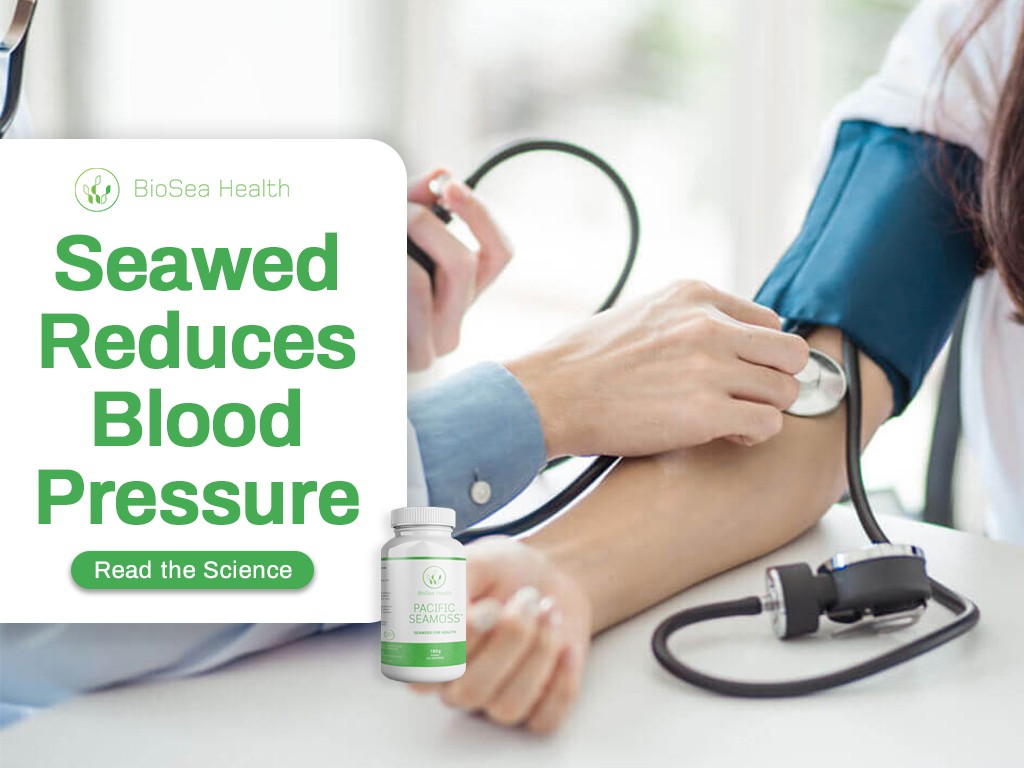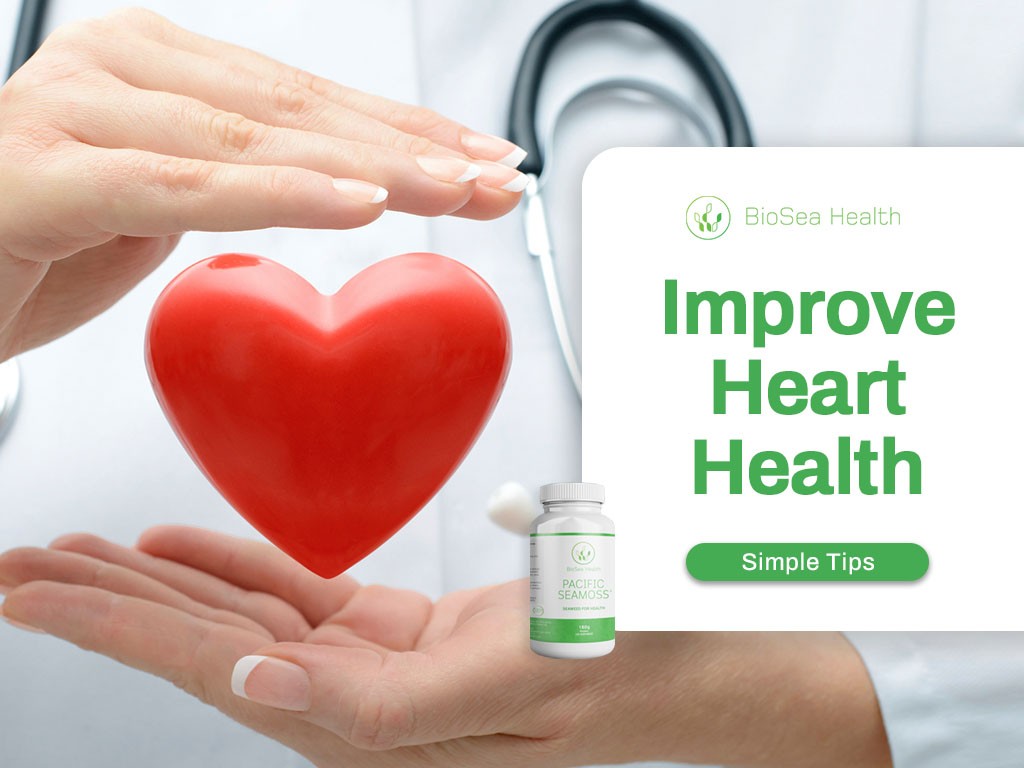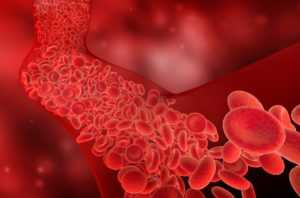Blood Pressure Control with Seaweed Dietary Supplement
Hi, I’m Dr Hugh Butler Co-founder. Over the past 8 years my blood pressure had slowly risen by 15 mmHg from 120 to 135. I had not realised this until I dug out the data. Was it just that I had aged 8 years? It was not a lifestyle disease as I have been doing upper body exercises and trying to do the moving more. I started eating Pacific Seamoss seaweed in October. The research for blood pressure control with seaweed dietary supplement was in the science literature when we started down this road. To my surprise, my blood pressure fell 15mm over 3 weeks. While 15mm may not seem much, it moves me from a Hazard Ratio from 1 down to 0.8. That’s a risk reduction of a heart event by 30%. (The hazard ratio is logarithmic).[1]


Blood Pressure Control with Seaweed 2007
Associate Professor Jane Teas [2] published 13 years ago blood pressure could be reduced if people took a seaweed dietary supplement. She published this information in a number of journals and articles but to our surprise, no one seemed to take any notice.
Method
- She used a good trial design of a double blind crossover clinical trial using 2 groups. One had lower levels of seaweed, with a placebo group and 4g, and another group ate medium (4g) or higher rate of seaweed (6g).
- The brown seaweed Undaria pinnatifida (Japanese wakame) was the seaweed supplement given.
- Only the sporophylls of the seaweed were used. This area of seaweed is used for smoothies.
- The blades and leaves were not used to avoid giving the patients high levels of iodine at the rates used..
- The seaweed was provided in capsules and treatments were placebo, none, 4g or 6g per day. On the high rate patients needed 12 capsules!
The patients, all volunteers had at least one of the symptoms of metabolic syndrome. The criteria for metabolic syndrome includes at least three of the following four conditions
- Waist circumference greater than 102 cm for men or greater than 88 cm for women;
- Fasting triglycerides greater than ≥ 150 mg/dL, HDL cholesterol < 40 mg/dL (male), < 50 mg/dL (female);
- Blood pressure greater than 130/85 mm Hg;
- Fasting glucose greater than 110 mg/dL.

All the participants had a large waist and 2 of the other symptoms. None of the participants were taking medication.
SEAWEED REDUCED BLOOD PRESSURE AND DECREASED WAIST

Results
The results are really clear and blood pressure control with seaweed dietary supplement is unequivocal. Seaweed reduced both blood pressure and weight:
- Seaweed reduced blood pressure by a about 12 to 16mmHg.
- There was a dose response. More seaweed reduced blood pressure more.
- There was no effect when the blood pressure was normal.
- Some participants (females only) lost over 6 cm of waist and lost weight as well(statistical)
As the trial was restricted to just 8 weeks then some changes may require longer consumption of the seaweed. Pressure Control with Seaweed
Prof Lindsay Brown (Wanyonyi et al 2017 [3]) from the University of Southern Queensland (USQ) has been studying functional foods for over 15 years. Functional foods are foods that are eaten in normal daily quantity that are just food, but they have a drug like additional effect. The experiment on blood pressure control with seaweed dietary supplement with Kappaphycus alvarezii was done as a prevention trial.
ANIMALS 2017 – BLOOD PRESSURE CONTROL WITH SEAWEED
Prof Lindsay Brown (Wanyonyi et al 2017 [3]) from the University of Southern Queensland (USQ) has been studying functional foods for over 15 years. Functional foods are foods that are eaten in normal daily quantity that are just food, but they have a drug like additional effect. The experiment on blood pressure control with seaweed dietary supplement with Kappaphycus alvarezii was done as a prevention trial.


Design of Experiment of Dietary Supplement
- One group of rats were fed normal rat chow.
- Second group were given a high fat, high sucrose diet (just like junk food)
- A third group had the junk food along with the seaweed at 5% w/w added to the seaweed. This amount of seaweed was designed to equate to the amount of seaweed humans are thought to consume daily.
Human: Queen Garnet Plum Trials
Prof Lindsay Brown has published over 174 articles over the past 15 years on “functional foods” and used rat obesity models. For most of these studies, blood pressure was reduced. In work with Queen Garnet Plums, rats showed a remarkable reduction in blood pressure. The animal study was followed by a human study in 2016 with 24 participants showed reduction in blood pressure but no cognitive improvement. [5]. It would not be unreasonable to assume other functional foods all provide reduction in hypertension in humans.
Conclusion: Results Are Hard to Believe!
The logical conclusion is actually very hard to accept. One can eat junk food with impunity! Remember, this study is with rats not humans. But the thought that one can eat junk food and instead of becoming obese, its as though you ate a standard diet.
In this animal trial, seaweed protected against
- Weight gain
- Increased blood pressure
- Reduced fatty liver
- Decreased glucose response
- Improved inflammatory diseases.
- Changes in microbiome.
Check out the publication for some of the big changes in inflammation in the heart and stomach.
Why?
The gut microbiome changed markedly. The figure below shows the very large effects on just 4 genera of bacteria. With Bacteriodes, you can see that the junk food diet reduced numbers. Seaweed reversed that and numbers are even higher than the standard diet. With a negative genera such as Clostridiacea bacteria, the levels with the junk food were 3 times higher, and the seaweed reduced the levels right back down to the standard diet.


Animal Studies 2020 – Seaweed
Professor Lindsay Brown and his team from USQ (du Preez et al 2020 [4]) repeated this experiment in 2019. Professor Nicholas Paul from University of the Sunshine Coast grew the seaweed in tanks at Bribie Island. The experiment is a repeat of many of Professor Brown’s trials with functional food, in that this trial design is an intervention trial. An intervention trial feeds rats over 6 to 8 weeks with a junk food diet. At this stage the rats are obese and have symptoms just like 65% of Australians or 80% of Americans have. (Like the human patients in Professor Teas trial as above. I.e. hypertension, visceral fat, glucose intolerance etc)
- They used a Southern Queensland red seaweed called Sarconema filiforme.
- Trial design was an intervention trial.
- Rats are fed either a standard or a high fat/sugar diet for 8 weeks. The junk diet has induced obesity in the rats.
- Treatment was then the introduction of red seaweed at 5% w/w for both standard and junk diets
- Animals were then measured over the next 8 weeks.


Conclusive Results: Blood Pressure Control with Seaweed
Key findings are much the same as in their previous seaweed prevention trial, the multiple trials with other functional food or even Professor Teas trials from 15 years previously.
- Seaweed started to reverse the weight gain from junk food.
- Seaweed decreased abdominal and liver fat.
- Junk food massively increased inflamed fatty liver cells
- Seaweed completely reversed the number of fatty liver cells by 100%. So while weight may not have returned to normal, inflammation from the junk diet disappeared.
- Total plasma cholesterol concentrations fell.
- Blood pressure increase by junk food was completely reversed by eating seaweed.


Microbiome are Key to Understanding
Like the previous 2017 paper gut microbiome changed. The correlation (Figure 12 of du Preez) is shown below.
Furthermore the authors were able to correlate between the bacterial community structure and the physiological parameters.

Conclusions – Unbelievable!
If you must eat eat junk food, eat seaweed. Seaweed reduces blood pressure ( hypertension); seaweed eliminates fatty liver; reduces inflammation; eliminates glucose intolerant; reduces high cholesterol, and reduces weight.
References
[1] Wu, C.-Y. et al. High Blood Pressure and All-Cause and Cardiovascular Disease Mortalities in Community-Dwelling Older Adults. Medicine (Baltimore) 94, (2015).
[2] Teas, J. et al. Could dietary seaweed reverse the metabolic syndrome? 145–157 http://apjcn.nhri.org.tw/server/APJCN/18/2/145.pdf (2009).
[3] Wanyonyi, S., du Preez, R., Brown, L., Paul, N. A. & Panchal, S. K. Kappaphycus alvarezii as a Food Supplement Prevents Diet-Induced Metabolic Syndrome in Rats. Nutrients 9, 2 (2017).
[4] du Preez, R. et al. Carrageenans from the Red Seaweed Sarconema filiforme Attenuate Symptoms of Diet-Induced Metabolic Syndrome in Rats. Mar. Drugs 18, 97 (2020).
[5] E.O. Igwe, K.E. Charlton, S. Roodenrys, K. Kent, K. Fanning, M.E. Netzel 2017. Anthocyanin-rich plum juice reduces ambulatory blood pressure but not acute cognitive function in younger and older adults: a pilot crossover dose-timing study. Nutrition Research 47 28-43 https://doi.org/10.1016/j.nutres.2017.08.00



